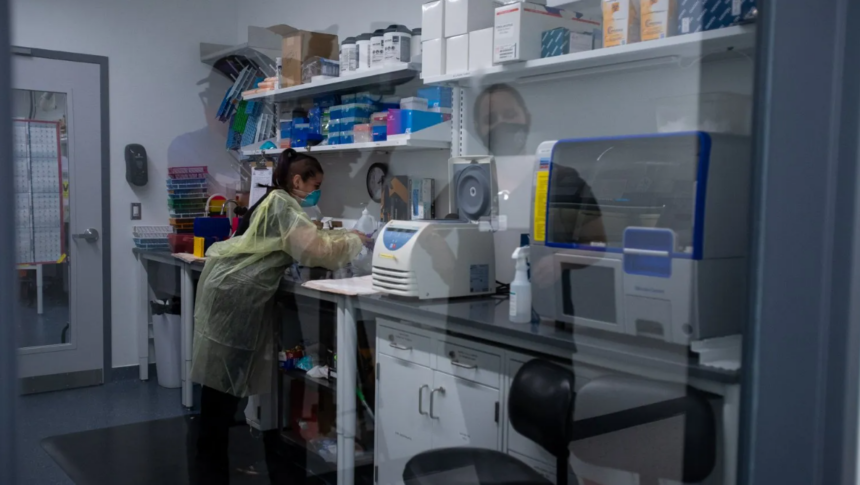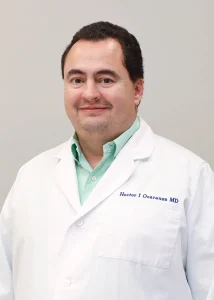Number of COVID-19 cases rise in El Paso with global spread of EG.5

by Priscilla Totiyapungprasert, El Paso Matters
August 16, 2023
El Paso is experiencing an uptick in COVID-19 cases again as the dominant virus strain Eris, or EG.5, spreads throughout the United States.
Eris is a subvariant of omicron, the coronavirus variant that in winter of 2021 caused one of the sharpest spikes in infections during the pandemic. El Paso also experienced a bump in COVID-19 cases last summer, as travel and crowded events resumed. At that time, preventative measures, such as masking on airplanes, also dropped.
The national rise in COVID-19 cases comes after the U.S. government stopped mailing free at-home tests and ended other pandemic-era health benefits. Health care providers and pharmacies will roll out an updated booster shot next month, but experts expect a cool reception because of the public’s declining concern about the virus, as well as both vaccine fatigue and skepticism, Reuters reported.
Natural immunity can wane rapidly and people should stay on top of their immunization to reduce the risk of COVID-19 complications, said city-county health authority Dr. Hector Ocaranza.

El Paso leads the country in immunization: 86% of the population is vaccinated with the initial series, according to CDC data. The rate for the updated, bivalent booster vaccine makes a significant fall to 19% of the population, however, which is a small step above the rate for the U.S. population.
“We continue recommending for people to pay attention to COVID because it is still circulating and will not go away completely,” Ocaranza said. “We recommend for those that are considered high-risk to be more careful along with their caregivers.”
The high-risk group includes people over the age of 60, people who are immunocompromised and people with underlying medical conditions such as lung or heart disease. Over the course of the pandemic, research has emerged on the long-term impacts of COVID-19, from damage to the cardiovascular system to compromising the cells in heart, kidney, liver and lymph nodes.
The U.S. Centers for Disease Control and Prevention tracks SARS-CoV-2 concentrations in wastewater and several El Paso water treatment plants had a spike in concentration beginning in June and July. People with mild to severe COVID-19 shed the virus in their feces. Wastewater surveillance data can provide an early warning of COVID-19 spread in communities, according to the CDC.

El Paso’s online COVID-19 dashboard indicates the community risk level is “low,” but also shows the county is experiencing more than twice as many COVID-19 cases over a seven-day average compared to one month ago. There are 874 active cases, according to the city’s weekly report.
The number of COVID-19 cases is likely an undercount because many people are testing for the illness at home and are not required to report their positive test results to the City of El Paso Health Department, though the city encourages residents to submit a self-disclosure form.
Ocaranza said hospitals and health care providers report the vast majority of the county’s COVID-19 case count and few reports come from self disclosure.
Hospitalizations and ICU admissions remain low compared to earlier in the pandemic and reflect scientific consensus that the omicron variant causes less severe acute symptoms than previous variants. As of Monday, 22 people in El Paso were hospitalized with COVID-19.
As COVID-19 immunity wanes, so does public concern
Since May, the federal government has stopped subsidizing Paxlovid, the antiviral drug that reduces the risk of hospitalization from COVID-19, and private insurance companies are no longer required to cover the costs of home tests.
Medicaid will continue to cover COVID-19 testing and Paxlovid treatment until Sept. 30, 2024, but the Texas Tribune reported that half a million Texans lost their benefits after the federal government ended continuous Medicaid coverage in April. Some of those Texans may not be aware they are no longer enrolled in Medicaid.
City-run health clinics and self-test kiosks offer free COVID-19 testing, but those sites have had little demand, Ocaranza said. As the pandemic has evolved, people’s attitude toward COVID-19 has also changed and they are not interested in testing or treatment, particularly those who consider themselves “healthy,” he said.

“I think people are a little bit blasé and just a little tired of dealing with the issue of COVID,” said Wendy Walker, an infectious disease scientist at Texas Tech University Health Sciences Center El Paso. “We all had to stay home for two years and we all hated that, social distancing, wearing the mask – it wasn’t fun for anybody. It’s still very important to get vaccinated.”
You could have long COVID – and not know it
Walker said staying up-to-date on vaccination can reduce the risk of long-term effects, referred to as long COVID – the subject she is researching. An estimated 6% of Americans have long COVID, according to a June report from the CDC.
Symptoms of long COVID range from mild to debilitating, and can last months to years after infection. Long COVID can weaken the immune system, cause chronic fatigue and cause brain fog, Walker said. Brain fog is characterized by fuzzy thinking and lack of mental clarity, similar to the symptoms of sleep deprivation.
Walker is studying the effects of long COVID on sleep and found that many people who’ve had COVID-19 experience trouble sleeping, she said. People with mild long COVID may not attribute their symptoms, such as fatigue or poorer quality of sleep, to COVID-19.
“I think when people have long COVID they brush it under the carpet,” Walker said. “They don’t know what to do about it. Their family physician might not know what to do with it, so many people who are experiencing long COVID are not getting referred to the right place.”
University Medical Center of El Paso launched the Post-COVID Rehab Program in December 2020 for people experiencing long COVID. UMC has yet to go one day without a COVID-19 patient since the pandemic began, said hospital spokesperson Ryan Mielke.

Long COVID patients, many of whom have never been hospitalized, typically spend one to six months in rehab, said Jesus Delgado, supervisor for the Post-COVID Rehab Program at UMC.
Some patients feel tired all the time and would get winded from basic activities, such as walking to the clinic, he said. The program was developed to help people return to the activities they were able to do before COVID-19, such as being able to walk up a flight of stairs without falling short of breath, accompanied by careful heart rate and blood pressure monitoring, Delgado said.
As newer variants of COVID-19 produce less severe symptoms, there has been a drastic reduction in the number of patients, Delgado said. He’s also aware that people still experiencing fatigue and weakness might not be aware the rehab clinic exists.
Walker said COVID-19 will at one point transition from a pandemic to an endemic, meaning the virus is still present, but the spread is contained in a stable and predictable way. Though the Biden administration declared COVID-19 is no longer a public health emergency, people who have COVID-19 should still stay at home to avoid spreading the virus, Walker said.
“There should be no shame in wearing a mask for anybody who wants to wear one,” she said.
This article first appeared on El Paso Matters and is republished here under a Creative Commons license.![]()
